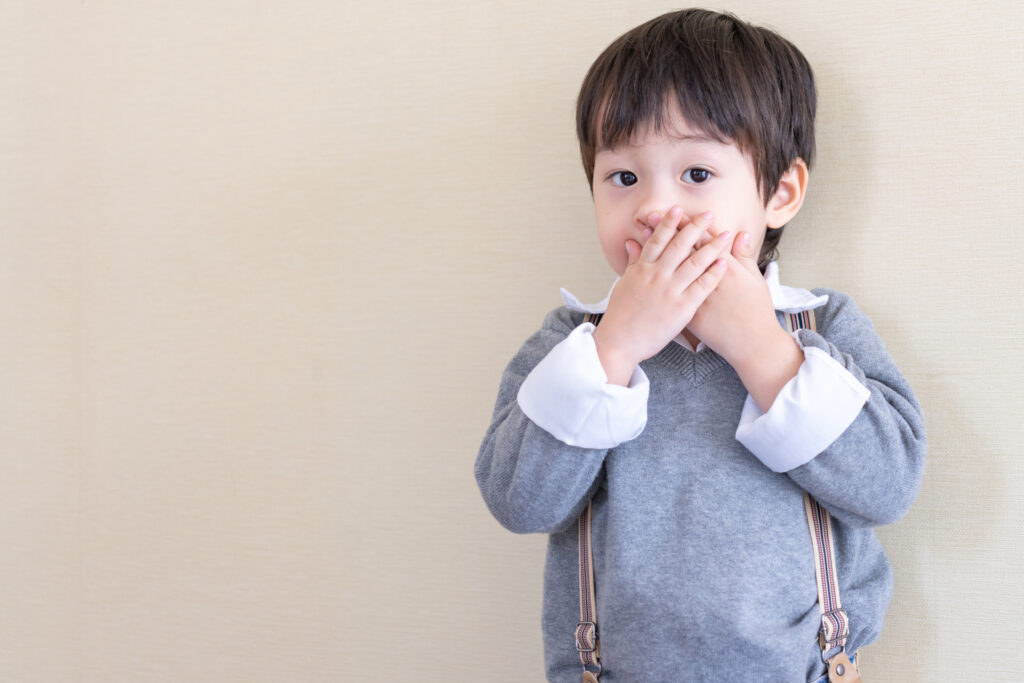What Causes Bad Breath in Kids?

Everyone experiences bad breath from time to time, but what if bad breath is the norm for your child and not just an occasional occurrence? Bad breath in children can cause embarrassment and social anxiety, and it may even serve as a warning sign that your child is suffering from a bigger health issue. If you frequently find yourself wondering, “Why does my kid’s breath smell so bad?”, it’s time to look into the cause. A trip to your child’s pediatrician or pediatric dentist may be in order.
Causes of Bad Breath in Children
Children experience halitosis (the medical term for bad breath) for a wide variety of reasons. Here are some of the most common causes of bad breath in children:
1) Consumption of Certain Foods. We all know that certain foods can cause bad breath; garlic and onions are perhaps the most notorious culprits. Did you know that they can give you bad breath even if you consume them through a feeding tube (so they never touch your mouth)? When you consume garlic and onions, certain sulfurous compounds are absorbed into your bloodstream and later excreted through the lungs, producing that classic garlic or onion breath.
This doesn’t mean you should cut garlic, onions and other healthy (though odiferous) foods out of your child’s diet. In the next section, we discuss some tips for how to minimize the damage that garlic and onions can do to your child’s breath.
2) Poor Oral Hygiene. Plaque is a sticky coating of bacteria that naturally forms on the surfaces of our teeth throughout the day. Some of the bacteria in plaque can create foul odors. When a child does not practice good oral hygiene, stinky bacteria can build up and cause bad breath in children.
3) Oral Infections. When plaque is not removed regularly and thoroughly, oral bacterial infections, such as tooth decay and gingivitis (gum disease), may result. The odor-releasing bacteria responsible for these types of oral infections can lead to chronic bad breath in children.
4) Dry Mouth. Saliva is your mouth’s natural cleaning agent. It washes away food particles and foul-smelling bacteria throughout the day, helping to keep your teeth clean and your breath smelling fresh. When a child experiences dry mouth (also known as xerostomia), it is easier for foul-smelling bacteria to accumulate inside the mouth, which can lead to halitosis.
What causes dry mouth in children? As with bad breath, there are numerous possibilities. Some of the more common causes of xerostomia in children include dehydration, mouth breathing, and the use of certain medications.
5) Improper Cleaning of Oral Appliances. Any and all appliances that go inside your child’s mouth – from athletic mouth guards to night guards to orthodontic retainers to dental space maintainers – need to be thoroughly and properly cleaned on a regular basis. Failure to clean these appliances properly can lead to a build-up of odor-causing bacteria on the appliance and in your child’s mouth.
6) Tobacco Use. You undoubtedly know that smoking puts your child at risk for a wide variety of health problems, but did you know that smoking affects the composition of bacteria in your plaque? Smoking cigarettes has been linked to both bad breath and gum disease.
7) Non-Oral Medical Conditions. Although the vast majority of cases of halitosis result from oral causes, the source of bad breath in children can sometimes lie outside the mouth.
For example, infections of the throat, tonsils, adenoids, and respiratory tract can all lead to bacteria buildup that results in bad breath. Similarly, foreign objects lodged in a child’s nasal passages (for example, if a toddler sticks a small toy up his or her nose) can collect odor-producing bacteria that leads to foul-smelling breath.
Gastrointestinal issues may also lead to bad breath. For instance, children with gastroesophageal reflux disease (GERD) experience backflows of stomach acid and undigested food into their esophagus, which can produce unpleasant odors.
How to Treat Bad Breath in Children
The proper remedy for a child’s bad breath depends on the cause. Below we examine some potential solutions for bad breath caused by each of the factors described above.
1) Consumption of Certain Foods. If your child’s love of garlic is to blame for his or her bad breath, try having your child eat raw apple or mint immediately after consuming garlic. According to Sheryl Barringer, a professor of food science at Ohio State University who has studied garlic’s effects on breath, raw apples and mint help neutralize the compounds in garlic that lead to bad breath. Eating parsley and drinking milk may also help.
These same remedies may also help neutralize onion breath.
Of course, it is also important for your child to brush and floss regularly to remove any garlic or onion (or other odor-causing food) particles that may be stuck in your child’s teeth.
2) Poor Oral Hygiene. Brushing for two minutes, twice a day, and flossing at least once a day are crucial for keeping teeth clean and preventing bad breath in children. Make sure to help your child brush until he or she is able to brush thoroughly without any assistance. (The exact age at which this occurs depends on the child, but typically parents should continue helping their children brush until they are at least seven or eight.)
Regular professional dental cleanings are also essential. Your child’s pediatric dentist can remove odor-causing plaque buildup in spots that are difficult to clean at home and can remove any accumulated tartar.
3) Oral Infections. Oral infections require professional treatment. The treatment required will depend on the type and extent of the infection. Your child’s pediatric dentist will be able to assess the infection and discuss treatment plan possibilities during your child’s dental exam.
4) Dry Mouth. Treating halitosis caused by xerostomia requires determining the cause of the dry mouth.
In some cases, encouraging your child to drink plenty of water throughout the day may be enough to eliminate your child’s bad breath.
If the xerostomia is the result of mouth breathing, discuss possible treatment options with your child’s pediatric dentist. In some cases, certain types of exercises (orofacial myofunctional therapy) and/or oral appliances (appliance therapy) can help train children to breathe through their noses instead of their mouths.
If xerostomia is a side effect of a medication your child is taking, it may be worth discussing with your child’s pediatrician whether it makes sense to try an alternative medication.
5) Improper Cleaning of Oral Appliances. Make sure your child thoroughly cleans his or her oral appliances on a regular basis, in accordance with the instructions given by your child’s pediatric dentist or orthodontist, as applicable. If your child is young or otherwise unable to clean the appliance properly, you may need to provide assistance. If you are unsure how to properly clean an appliance, consult with your child’s pediatric dentist or orthodontist.
6) Tobacco Use. We advise you to strongly discourage your child from using tobacco products, both to prevent bad breath and to protect your child’s oral and overall health.
7) Non-Oral Medical Conditions. You should consult your child’s pediatrician if you suspect your child may have an infected throat, tonsil, adenoid or respiratory tract; if you are concerned that your child may have stuck a foreign object up his or her nose; or if you believe that your child may be experiencing gastrointestinal issues.
Schedule an Appointment for a Dental Cleaning and Exam at Hurst Pediatric Dentistry
If your child has bad breath on a frequent basis, it’s a good idea to schedule an appointment with a pediatric dentist.
Hurst Pediatric Dentistry’s Dr. Lin is a board-certified pediatric dentist who has been specially trained to
- assess your child’s oral hygiene level,
- clean any foul-smelling bacteria accumulating on the teeth,
- detect and treat oral infections,
- discuss treatment options for dry mouth, and
- review proper cleaning techniques for oral appliances.
If the cause of the halitosis appears to be non-oral, Dr. Lin can refer your child to a pediatrician as needed. Contact our office at (817) 510-6400 to schedule your appointment.
Hurst Pediatric Dentistry is located in Hurst, Texas, and serves children from Hurst, Euless, Bedford, North Richland Hills, Fort Worth, Colleyville, Keller, Southlake, Arlington, Irving and the surrounding areas.
This article is intended to provide general information about oral health topics. It should not be used to diagnose or treat any medical condition or as a substitute for the advice of a healthcare professional who is fully aware of and familiar with the specifics of your case. Always seek the advice of your dentist or other qualified healthcare provider with regard to any questions you may have relating to a medical condition or treatment.
MEDICALLY REVIEWED BY:
Dr. Jin Lin

Dr. Jin Lin is a board-certified pediatric dentist with a passion for helping children achieve healthier, more beautiful smiles. He earned his Bachelor of Science degree from Cornell University and his Doctor of Dental Medicine (D.M.D.) degree from the Harvard School of Dental Medicine. After graduating cum laude from dental school, he completed his post-doctoral pediatric dentistry training at Boston Children’s Hospital and the Harvard School of Dental Medicine, where he served as chief resident and worked with children with a wide variety of special medical and dental needs, including children with rare syndromes.

